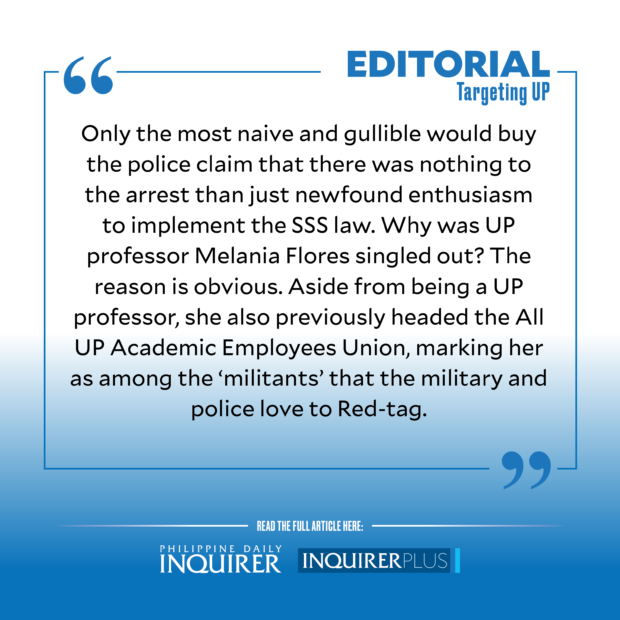Targeting UP
Not paying the Social Security System (SSS) contributions of one’s employee, like not paying taxes, is certainly an infraction that could land someone in jail.
But in these parts where such crimes are erratically prosecuted, with influential people able to exploit loopholes in the law to ignore tax evasion cases, the recent action of the Quezon City Police District (QCPD) in arresting a professor of the University of the Philippines is baffling, to say the least.
As though they were pursuing terrorists or criminals behind some heinous crimes, the QCPD tagged UP professor Melania Flores as a ‘’most wanted person” for alleged nonpayment of her share in her household worker’s SSS contribution. Armed with a warrant secured from a Quezon City judge back in September 2022, members of the QCPD wearing civilian clothes and pretending to be workers from the Department of Social Welfare and Development descended on Flores’ residence inside the UP Diliman campus last week to arrest her.
Why was it necessary for the QCPD to conduct such a clandestine operation? As there were no other arrests concerning violations of the SSS law on that day or the days after, it was clear that the UP professor was the sole target of the QCPD’s operation.
Only the most naive and gullible would buy the police claim that there was nothing to the arrest than just newfound enthusiasm to implement the SSS law. Why was Flores singled out? The reason is obvious. Aside from being a UP professor, she also previously headed the All UP Academic Employees Union, marking her as among the “militants” that the military and police love to Red-tag.
Ordinarily, this case would have been easily resolved without upsetting the entire UP community. Flores has said that she was not aware of the case against her, and that the household worker was no longer in her employ since 2013. She had already cleared the matter with the SSS, she added.
The only plausible reason behind Flores’ arrest was to breach the existing agreement between UP and the Department of the Interior and Local Government (DILG), which requires the Philippine National Police to secure permission from the UP administration before conducting any operation inside the campus. UP Diliman chancellor Fidel Nemenzo said none of the provisions of the UP-DILG accord were followed during Flores’ arrest, including the need for prior notice, the police being in uniform, and faculty members being present as witnesses. “We shall continue to resist threats to our academic freedom and institutional autonomy as we continue to defend and uphold our campus as a zone of peace,” Nemenzo said.
The 1992 UP-DILG accord was an offshoot of the 1989 agreement between UP and the Department of National Defense, which provided that no member of the Armed Forces of the Philippines, the Police Constabulary (now the PNP), and the Citizens Armed Forces Geographical Unit may conduct operations inside the UP Diliman campus without prior coordination with the UP administration, except for hot pursuit cases.
The UP-DND accord was signed to protect academic freedom and the institutional autonomy of the premier state university, which led the fight for freedom during the Marcos-era martial law years. The agreement was inked following the abduction of Donato Continente, a staff of the student publication UP Collegian, inside the campus by agents of the Criminal Investigation Service for his alleged involvement in the killing of US Army officer Col. James Rowe.
The accords have worked pretty well until Delfin Lorenzana, defense secretary of then President Rodrigo Duterte, unilaterally canceled the 1989 agreement in 2021, claiming that the university had become a “safe haven for enemies of the state,” with the “clandestine recruitment” of students by communist organizations.
UP and the DILG have formed a working committee to review the 1992 accord, so the QCPD’s underhanded operation was totally uncalled for. If the QCPD’s only intention was to arrest Flores for a labor case, what prevented them from making the proper coordination with the university? Flores said the cops had told her: “We don’t acknowledge the UP-DILG accord. We wouldn’t be able to arrest anybody if we followed that.”
What made things worse was the statement of QCPD Director Brig. Gen. Nicolas Torre III, who said that he would even commend his officers for the way they conducted the arrest. “UP should be thankful to us that we removed a criminal in their midst,” Torre said. Whatever happened to presumption of innocence? If this was accorded the son of the justice secretary who was accused of the more serious crime of drug possession, surely other citizens, like this UP professor, should be entitled to it?
The QCPD action and the attitude of its officers are proof positive that the culture of impunity and abuse continues to prevail in the police force. Is the PNP chief, who has promised to implement reforms to improve the police image, going to do anything about this? As well, shouldn’t the SSS speak up on police abuses being committed in its name?





















